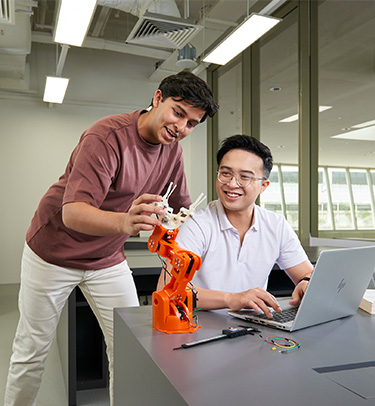Have you been eager to find out more about the other disciplines that PSB Academy offers? Well, you won’t have to wait any longer!
In Part Two of this series, we give you a quick introduction to the disciplines offered under both the School of Engineering and Technology as well as the School of Life and Physical Sciences.
Are you ready? Let’s begin!
1) Life Sciences
The life sciences, in a nutshell, encompass the branches of science that study living organisms. Biology is the foundation of life sciences; if you’ve enjoyed studying the subject in secondary school, JC, or polytechnic, further education in this discipline could be something worth pursuing.
Contrary to popular belief, life science graduates aren’t just academics or researchers! You can work both in and outside the laboratories at biopharmaceutical companies, non-profit organisations, or in commercial sectors like medical communications that require individuals with a life sciences background. You could also pursue additional training to become a life sciences educator in schools and enrichment centres! The possibilities are numerous.
2) Sports Science
Are you a fitness enthusiast? Or are you interested about the way exercise affects our health?
You might find your dream career within the fascinating field of sports science! This multidisciplinary discipline explores the scientific principles behind exercise performance, and how to bring this to optimal levels in high-performance sports.
Sports science professionals are knowledgeable in physiology, biomechanics, and sports psychology, and they can be found working in a wide range of areas ranging from sports nutrition to personal training or coaching. Graduates can also explore further education or training, which opens up opportunities for careers in research and academia or sports journalism, for instance!

3) Engineering
If you enjoy taking things apart to see how they work, constantly tinker with machinery or appliances in the home, and have built a nifty invention or two for fun, you’ll enjoy the engineering discipline.
Engineers are creative and detail-oriented individuals who work on developing ideas into working solutions for everyday problems that we face. Due to their training and education, they are especially adept at critical thinking and problem-solving.
These skills, along with a close attention to detail, are highly transferable across non-engineering roles! Here’s a cool fact: LinkedIn analysed 12,000 CEO profiles in 2018 and found electrical engineering to be the fifth most popular field of study[i]. The platform also revealed that engineering was the most common first job function amongst these CEOs after business development and sales[ii]!

4) IT and Computer Science
While computer science and information technology (IT) might overlap, they are actually two distinct disciplines! Computer science professionals focus on the theory and design of algorithms and data structures, as well as programming. They can specialise in the fields of software development, systems engineering, or web development, working to understand key computing technologies and solve software issues.
Meanwhile, IT professionals help to manage a business or organisation’s IT infrastructure and assets. They can work for companies in roles such as network engineers and project managers, for example, or offer their expertise as IT consultants! While IT professionals do touch on programming, they are primarily work with existing solutions and need to be well-versed in networking, virtualization, as well as system administration.
5) Cybersecurity
Demand is robust for cybersecurity professionals in today’s digital age: the Australian Cyber Security Network estimates that the global cybersecurity market will be worth US$270 billion by 2026, an 86% increase from approximately US$145 billion[iii].
The cybersecurity specialist is one of the top 15 fastest-growing job locally[iv], and the Singapore Government has launched the SG Cyber Talent initiative to nurture the next generation of cybersecurity leaders[v]. If you’re game to join a growing field with many opportunities, kickstart your journey with a cybersecurity course!
Do note that cybersecurity professionals need to be familiar with common programming languages like Java and C++ and possess knowledge in systems and network architecture. They must also be able to remain cool under pressure, as cyberattacks of any scale can happen at any time, and have a quick and analytical mind.
After learning more about the various disciplines that PSB Academy has to offer, have you shortlisted the ones that interest you the most? Don’t worry if you’re still unsure! We welcome you to visit our course pages to find out more about our programmes, and to contact our friendly consultants if you have any further queries. They will be happy to help you in any way we can!
Did you miss out on Part One of this series, where we cover the disciplines offered under the School of Business and Management and School of Postgraduate Studies? Don’t forget to check it out—the perfect discipline could be waiting for you!
We look forward to welcoming you to PSB Academy! Stay home and stay safe!
[i] https://business.linkedin.com/talent-solutions/blog/trends-and-research/2018/what-12000-ceos-have-in-common
[iii] https://www.austcyber.com/resources/sector-competitiveness-plan/chapter1
[iv] https://business.linkedin.com/content/dam/me/business/en-us/talent-solutions/emerging-jobs-report/SG_EJR_2020_Final.pdf




 TOP
TOP



_2.png)

